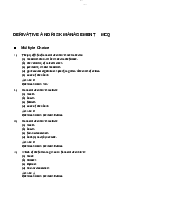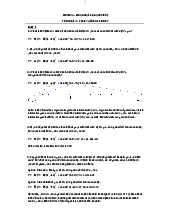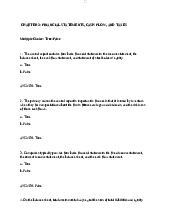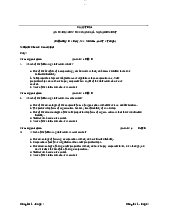



Preview text:
lOMoARcPSD|44744371 lOMoARcPSD|44744371 FSY TUTORIAL 5 PCP
I think both arguments are correct. Because: -
A money market investment has both pros and cons, it can’t be any absolute decision. -
With point no: Investors always want to maximize shareholder returns in the company,
but when participating in the money market, it offers a lower rate of investment with a
lower return than when not participating. they can choose short-term investment with
high liquidity for higher return but it carries very high risk -
Counter point: yes because When they invest in the money market, they can avoid having
to borrow at high interest rates, thus taking a big risk when investing with different costs
that investors cannot anticipate.
(mặc dù short tẻm invest to liquidity. that frm can mânge the liquidity problem. short tẻm is
beter. btw have others ưay to mânge liquidity, but not the best) Question 4:
Commercial Paper Who issues commercial paper? What types of financial institutions issue
commercial paper? Why do some firms create a department that can directly place commercial
paper? What criteria affect the decision to create such a department? Answer:
- Commercial paper is normally issued by well-known, creditworthy firms.
- Bank holding companies and finance companies commonly issue commercial paper
- Those firms that issue commercial paper may decide to establish a department that can directly
place the paper. In this way, the firms can avoid the transactions costs incurred when commercial
paper dealers issue commercial paper. Such a strategy is only worthwhile if the firms
continuously issue commercial paper. Question 5:
Commercial Paper Ratings Why do ratings agencies assign ratings to commercial paper? lOMoARcPSD|44744371 Answer -
Ratings are assigned to designate the degree of default risk associated with commercial
paper. Companies issuing commercial paper pay rating services in order to have their paper rated. Question 6:
Commercial Paper Rates Explain how investors’ preferences for commercial paper change
during a recession. How should this reaction affect the difference between commercial paper
rates and T-bill rates during recessionary periods? Answer: -
Investors are less interested in commercial paper during a recession because the
probability of default increases. -
Consequently, issuers of commercial paper must offer a higher premium above the
prevailing risk-free rate in order to make the paper attractive to investors Question 8:
Repurchase Agreements Based on what you know about repurchase agreements, would you
expect them to have a lower or higher annualized yield than commercial paper? Why? Answer
Repurchase agreements with a similar maturity as commercial paper would likely have a slightly
lower yield, since they are typically backed by Treasury securities. Question 9:
Banker’s Acceptances Explain how each of the following would use banker’s acceptances: (a) exporting firms, (b) importing firms, (c) commercial banks (d) investors lOMoARcPSD|44744371
For all each of the following the bank is the third party involved in the transaction and by issuing
banker's acceptance the bank would guarantee each of these four parties their payment in case of
default by whomever they are trading with. Answer A banker's acceptance can
(a) protect an exporter from the risk of nonpayment by the importer.
(b) protect importing firms from the risk of paying for goods without ever receiving them
(c) enable banks to offer exporters and importers a service for which it charges a fee
(d) offer investors an investment instrument (when exporters sell the acceptance in the secondary market) Question 11:
Motive to Issue Commercial Paper The maximum maturity of commercial paper is 270 days.
Why would a firm issue commercial paper instead of longerterm securities, even if it needs funds for a long period of time? Answer
The firm may be unwilling to lock in the prevailing long-term yield on bonds, perhaps because it
expects that long-term interest rates (and yields offered on new bonds) will decline in the near future. Problem
4. Repurchase Agreement Stanford Corporation arranged a repurchase agreement in which it
purchased securities for $4.9 million and will sell the securities back for $5 million in 40 days.
What is the yield (or reporate) to Stanford Corporation? PP =$4.9 SP=$5 N=40 lOMoARcPSD|44744371 SP−PP X 360
$ 5−$ 4.9 x 360 Y = PP n = $ 4.9 40 = 18%
5. T-Bill Yield You paid $98,000 for a $100,000 T-bill maturing in 120 days. If you hold it
until maturity, what is the T-bill yield? What is the T-bill discount? PP = $98.000 SP = $100.000 n= 120 days
Yt = (100.000-98.000/98.000) x 365/120=6.2%
YD = (100.000-98.000/98.000)X 360/120= 6%
6. T-Bill Yield The Treasury is selling 91-day T-bills with a face value of $10,000 for $9,900.
If the investor holds them until maturity, calculate the yield n=91 days PP = $9.900 SP =$10.000
Yt = (10000-9900/9900)x365/91= 4%
10. Return on NCDs Phil purchased an NCD a year ago in the secondary market for $980,000.
The NCD matures today at a price of $1million, and Phil received $45,000 in interest. What is Phil’s return on the NCD? SP = 1.000.000 PP=980.000 Receive interest = 45.000 Yncd = 1 000000 − 980000 + 45000 = 6.6% 980000




